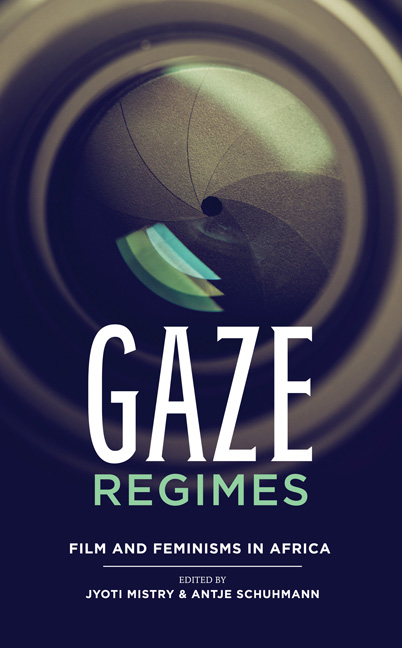Book contents
- Frontmatter
- Contents
- Acknowledgements
- Foreword: Goethe-Institut sub-Saharan Africa
- Introduction: By way of context and content
- 1 African Women in Cinema: An overview
- 2 ‘I am a feminist only in secret’
- 3 Staged Authenticity: Femininity in photography and film
- 4 ‘Power is in your own hands’: Why Jihan El-Tahri does not like movements
- 5 Aftermath – A focus on collective trauma
- 6 Shooting Violence and Trauma: Traversing visual and social topographies in Zanele Muholi's work
- 7 Puk Nini – A Filmic Instruction in Seduction: Exploring class and sexuality in gender relations
- 8 I am Saartjie Baartman
- 9 Filmmaking at the Margins of a Community: On co-producing Elelwani
- 10 On Collective Practice and Collected Reflections
- 11 ‘Cinema of resistance’
- 12 Dark and Personal
- 13 ‘Change? This might mean to shove a few men out’
- 14 Barakat! means Enough!
- 15 ‘Women, use the gaze to change reality’
- 16 Post-colonial Film Collaboration and Festival Politics
- 17 Tsitsi Dangarembga: A manifesto
- Acronyms and Abbreviations
- List of Contributors
- Filmography
- Index
6 - Shooting Violence and Trauma: Traversing visual and social topographies in Zanele Muholi's work
Published online by Cambridge University Press: 20 April 2018
- Frontmatter
- Contents
- Acknowledgements
- Foreword: Goethe-Institut sub-Saharan Africa
- Introduction: By way of context and content
- 1 African Women in Cinema: An overview
- 2 ‘I am a feminist only in secret’
- 3 Staged Authenticity: Femininity in photography and film
- 4 ‘Power is in your own hands’: Why Jihan El-Tahri does not like movements
- 5 Aftermath – A focus on collective trauma
- 6 Shooting Violence and Trauma: Traversing visual and social topographies in Zanele Muholi's work
- 7 Puk Nini – A Filmic Instruction in Seduction: Exploring class and sexuality in gender relations
- 8 I am Saartjie Baartman
- 9 Filmmaking at the Margins of a Community: On co-producing Elelwani
- 10 On Collective Practice and Collected Reflections
- 11 ‘Cinema of resistance’
- 12 Dark and Personal
- 13 ‘Change? This might mean to shove a few men out’
- 14 Barakat! means Enough!
- 15 ‘Women, use the gaze to change reality’
- 16 Post-colonial Film Collaboration and Festival Politics
- 17 Tsitsi Dangarembga: A manifesto
- Acronyms and Abbreviations
- List of Contributors
- Filmography
- Index
Summary
Zanele Muholi is currently one of South Africa's internationally acclaimed artists. The main focus of her work is the representation of black lesbians and transgender people at the intersection of race and class.
Although she is perhaps best known as a photographer, she does not work exclusively in this medium, but in dialogue with films, clips, installations, beadwork and other media. Her intention is not to produce single masterpieces – l'art pour l'art – but rather an inter-textual multitude of visual representations of the Other. Her work may be situated in the context of feminist artists such as Phybia Dlamini and Gabrielle le Roux, who produce art at the intersection of community engagement, youth development and the documentation of the margins of hetero-normative societies through the bricolage of film, installations, writing, drawing and photography.
Muholi's aim is to challenge not only the normativity of heterosexuality, but also to subvert the dominant impression of homosexuality as a mainly white, Western and middle-class phenomenon. Her artistic exploration of body politics produces a voice that articulates a community's condition into the collective silence.
The multiple forms of her artistic expression follow Muholi's political interests: the promotion of human rights and equality for persons with non-conforming gender-performances. She herself locates her artwork within what she calls ‘visual activism’.
Feminist and post-colonial analyses of representational politics generate particular aesthetic and ethical questions and dilemmas which can be well illustrated through a consideration of Muholi's art (Schuhmann 2014b). This chapter looks at her work in its own right, while at the same time using Muholi's art to engage a resonant spectrum of questions around the wider political economy of representing violence and trauma. This includes the challenge of subverting contemporary practices of Othering and their multiple legacies of oppression, as well as the risk of inadvertent complicity with hegemonic gaze regimes. To understand fully the representative strategies mobilised by Muholi, and in order to engage these questions, it is necessary to embrace her full body of work and to try to interpret it within wider theoretical considerations, from postcolonial film theory, trauma studies, socio-linguistics and psychoanalytic cultural theory.
- Type
- Chapter
- Information
- Gaze RegimesFilm and feminisms in Africa, pp. 55 - 80Publisher: Wits University PressPrint publication year: 2015



